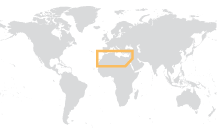EIB water expertise benefits Jordan
Jordan's image is intimately associated with water, the Mediterranean world, the Red Sea, the Dead Sea and the mythical River Jordan from which the country derives its name - so much so that it is hard to grasp that it is in fact one of the most arid countries on the planet alongside Tanzania, Sudan and Ethiopia. Yet more than 80% of this ancient land has been abandoned to the desert, even though in Jordan it takes on the magnificent forms of a land of ochre sand or a lost city hewn from the cliffs of pink sandstone bordered by a sea of salt.
In May 2009, the EIB granted Jordan a USD 100m loan to enable it to build a strategic aqueduct to carry water drawn from an immense aquifer beneath the desert. As well as providing financial engineering the EIB made its leading-edge water expertise available to Jordan, underpinning a long-term reform of the country's water policy.
The Hashemite Kingdom has launched several emergency plans in efforts to prevent complete desertification. One key element is a gigantic USD 1bn project to build the new aqueduct that will link Disi in the south of the country to Amman.
This will tap into an immense reserve of fresh water lying around 500 metres under the Disi desert that was formed drop by drop since the Pleistocene glaciations era. This reserve contains enough drinking water to supply Amman for some fifty years. At present, this precious resource is pumped mainly for irrigation purposes in the middle of the desert, sometimes for very water-intensive crops such as citrus fruit, bananas and tomatoes.
EIB support for a long-term recasting of Jordan's water policy
Accordingly the EIB has financially backed this project, which it has also helped to structure as a public/private partnership - the first of this type in Jordan's water sector. But the support provided by the European Union's bank is comprehensive and looks far ahead, going hand in hand with efforts to ensure that this aqueduct fits organically into a national water policy that is viable over the long term.
To this end an EIB water engineer, who is also a Jordan specialist, cooperated for several months with the Ministry of Water and Irrigation in jointly establishing measures for country-wide rebalancing of water demand between irrigation and domestic usage and for corresponding remodelling of water tariffs. These measures will also help to control excessive pumping of reserves close to the surface in the north of Jordan so as to allow them to replenish themselves, thereby lengthening the life of the country's natural reserves. All these measures have been incorporated into the ambitious Water for Life policy that Jordan plans to pursue up to 2022.
The Disi-Amman aqueduct has also been conceived in a long-term perspective. One carefully developed option would allow connection one day to a possible Red Sea desalination plant, which could in several decades' time constitute an ultimate source of drinking water for Jordan.
Finally, the EIB is currently looking at the possibility of making a second loan to Jordan to help it plug the numerous leaks in its water distribution network. The European Union's bank will therefore be shoulder to shoulder with the Hashemite Kingdom for many years to come.
On average, Jordanians have 145 cubic metres of water per person per year, which is what Europeans get through in ten days or so. Amman is supplied with water once a week for several hours. Global warming and population growth are increasing the urgency of the situation. Water is Jordan’s blue gold – the key to its service economy and a condition for its survival.
The EIB in the Mediterranean
The EIB has a financial arm dedicated to its activities in the Mediterranean, namely the Facility for EuroMediterranean Investment and Partnership (FEMIP), which has been operational since October 2002. FEMIP’s remit is to promote development in nine countries – Algeria, Egypt, Gaza-West Bank, Israel, Jordan, Lebanon, Morocco, Syria and Tunisia – as part of Europe’s neighbourhood policy. Its two investment priorities are to support the private sector economy as the source of sustainable growth, and to create an investment-friendly environment through efficient infrastructure and appropriate banking systems.

